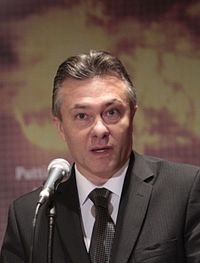Cristian Diaconescu | |
|---|---|
 Diaconescu in 2009 | |
| Leader of the People's Movement Party | |
| In office 7 March 2021 – 19 February 2022 | |
| Preceded by | Emil-Marius Pașcan (Acting) |
| Succeeded by | Eugen Tomac |
| Minister of Foreign Affairs | |
| In office 24 January 2012 – 7 May 2012 | |
| Prime Minister | Emil Boc Mihai Răzvan Ungureanu |
| Preceded by | Teodor Baconschi |
| Succeeded by | Andrei Marga |
| In office 22 December 2008 – 1 October 2009 | |
| Prime Minister | Emil Boc |
| Preceded by | Lazăr Comănescu |
| Succeeded by | Cătălin Predoiu (interim) |
| Member of the Senate of Romania | |
| In office 15 December 2008 – 29 May 2012 | |
| Constituency | Bucharest |
| In office 13 December 2004 – 14 December 2008 | |
| Constituency | Constanța County |
| Minister of Justice | |
| In office 10 March 2004 – 28 December 2004 | |
| Prime Minister | Adrian Năstase |
| Preceded by | Rodica Stănoiu |
| Succeeded by | Monica Macovei |
| State Secretary at the Ministry of Foreign Affairs | |
| In office 28 December 2000 – January 2004 | |
| Prime Minister | Adrian Năstase |
| Minister | Mircea Geoană |
| Personal details | |
| Born | 2 July 1959 Bucharest, Romania |
| Political party | Independent (2022–present) |
| Other political affiliations | Romanian Communist Party (until 1989) Social Democratic Party (2002–2010) National Union for the Progress of Romania (2010–2012) People's Movement Party (2014; 2020–2022) |
| Spouse | Mariana Diaconescu[1][2] |
| Children | Mariana[1][2] |
| Alma mater | University of Bucharest |
| Occupation | Judge, Diplomat, Politician |
| Profession | Jurist |
Cristian Diaconescu (Romanian pronunciation: [kristiˈan di.akoˈnesku]; born 2 July 1959) is a Romanian jurist and politician. He previously belonged to the National Union for the Progress of Romania (UNPR) and the Social Democratic Party (PSD), as well as to the People's Movement Party (PMP), which he led from 2021 to 2022. He sat in the Romanian Senate from 2004 to 2012, representing Constanța County from 2004 until 2008, and subsequently Bucharest. In the Adrian Năstase cabinet, he was Minister of Justice from March to December 2004; in the Emil Boc cabinet, he was Minister of Foreign Affairs between 2008 and 2009. He returned to the position in 2012, also under Boc, and continued in this capacity under Boc's successor, Mihai Răzvan Ungureanu.
- ^ a b (in Romanian) Profile at the Romanian Government site Archived 17 January 2014 at archive.today. Retrieved 29 June 2009.
- ^ a b (in Romanian) "Cristian Diaconescu, judecător pe uliță" ("Cristian Diaconescu, Judge on the Road"), Evenimentul Zilei, 15 February 2008. Retrieved 29 June 2009.